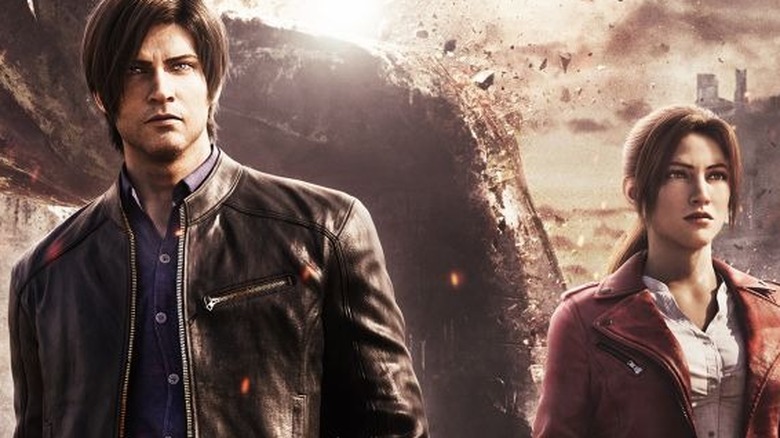Resident Evil's Rule For Critics Is Turning Heads
"Resident Evil" has the gaming world's attention after the release of "Village." Gamers begged for DLC to help round out the dark world of "Resident Evil 8," and Capcom is providing additional content to meet fan demands. Even though "Resident Evil 9" may take years to make, gamers still have plenty to celebrate with the 25th anniversary of the series. If new gaming content isn't enough, there's also a Netflix adaptation of "Resident Evil” on the way. Fans are growing increasingly excited for Netflix's "Resident Evil" adaptation, "Infinite Darkness," but one new rule the series has for critics seems strange, even for residents of Racoon City.
Charles Pulliam's review of "Infinite Darkness" at Gizmodo makes it clear that the animated miniseries has political themes. "Resident Evil" aficionados know that the insane story of the series is inextricably intertwined with political allegories, so their inclusion in a film adaptation shouldn't surprise anyone. However, in a surprising turn of events, Pulliam revealed that an NDA sent to critics forbid reviewers from drawing comparisons to real-life political events.
Pulliam tweeted, "Actually thought Resident Evil: Infinite Dark's story was one of the better entries in the franchise outside of the games. But the studio's ask that reviews not at all talk about real-world events or politics ended up casting a shadow over the entire movie for me." Pulliam did not specify who the embargo agreement came from — TMS Entertainment, Capcom, or Netflix — but regardless, the rule seemed odd to fans of the "Resident Evil" series.
Politics and Resident Evil go hand in hand
To emphasize the strangeness of this request, Pulliam tweeted a series of images from the Netflix series. The first photo shows Claire and Leon in front of the White House, while the second shows a character (presumably the President of the United States) sitting in front of an American flag. In other words, it seems almost impossible for a story in this setting to not contain political themes, and the request to not discuss those politics seems odd to critics.
One gamer rightfully pointed out that the gaming industry can be hypocritical. They tweeted, "Every game company:I hope you are excited for the release of Global War 7: America vs The Middle East. But please, our games are not political so it's unfair to review them against modern politics." This fictional comparison may remind gamers of the very real controversy surrounding "Six Days in Fallujah," which dramatizes the events of the Iraq War.
The "Resident Evil" series has always been about the pursuit of power and the willingness of governments to obtain that power through dangerous bioweapons. While it's over the top, much of the series follows a story of political intrigue. While the embargo agreement might have come from the studio responsible for "Infinite Darkness" and not Capcom itself, the decision is still puzzling to both critics and fans of "Resident Evil."


